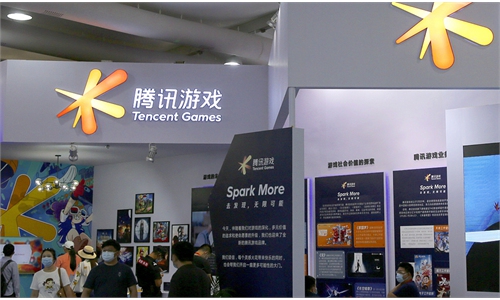
A person plays the game "Honor of Kings" on his smartphone in Shenzhen, South China's Guangdong Province on Wednesday. Photo: IC
More than four Chinese central authorities, including the Publicity Department of the Central Committee of the Communist Party of China, summoned key online game companies such as Tencent and NetEase for talks on Wednesday, in the latest effort to prevent growing gaming addiction and create a better gaming environment for minors in the country.
Authorities have asked these firms to strictly comply with time limits for providing online games to minors, and said that online game account rental and sales services shall not be provided in any form to them, according to a report from the Xinhua News Agency late on Wednesday.
Platforms that rent and sell games, and game live broadcast platforms, were also summoned for the Wednesday talks.
Authorities asked them to strengthen the review and control of online game content, strictly prohibit illegal content such as incorrect value orientation, obscenity, and bloody violence, and resolutely resist unhealthy cultural features such as money worship, sissy men, and Dan Mei – a Chinese subculture centered on fictional homoromantic or homoerotic relationships.
Game companies are also asked to consciously resist unfair competition, prevent excessive concentration and even monopoly practices, and place the focus on promoting technological innovation and better satisfying the new expectations of the people's spiritual and cultural life.
Supervision of spending by underage players should be strengthened, and the trend of “money-oriented” and “traffic-oriented” games should be contained, according to the talks.
Meanwhile, gaming firms should resolve to alter playing rules and designs that could lure players to indulge in the game.
Specifically, they are asked to strictly manage game promotion, regulate and restrict celebrity endorsement game advertisements, and they must not provide promotion channels for illegal games. It’s also necessary to manage game live broadcasts, and prohibit high-value rewards and rewards for minors.
“The talks came at an appropriate time, and it is a necessary move in line with the nation’s tightening regulation of online gaming, the addiction to which could have an impact on both the physical and mental health of minors,” Liu Dingding, a Beijing-based tech analyst, told the Global Times on Wednesday.
Liu noted that some third-party platforms, which have been found merchants selling gaming accounts for the minors, should prohibit the release of such information and be imposed penalties once it is discovered.
China banned minors (those under 18 years old) from playing video games for more than three hours a week at the end of August. Given that, some merchants are intending to bypass the regulation by providing services like renting accounts, thus forging a gray industry chain.
Apart from the crackdown on gaming firms, Liu suggested that parents should shoulder the responsibility of post-regulation supervision, meaning they should try to create a favorable family environment for children to grow up.
The National Press and Publication Administration, Central Cyberspace Administration of China, the Ministry of Culture and Tourism and other departments also attended the talks.
Tencent said in a statement it sent to the Global Times on Wednesday that it will earnestly study the spirit of the interviews, strictly implement the relevant regulations and requirements for preventing minors from addiction, strengthen content security and compliance, adhere to the correct value orientation, and effectively protect the physical and mental health of minors.
Global Times

